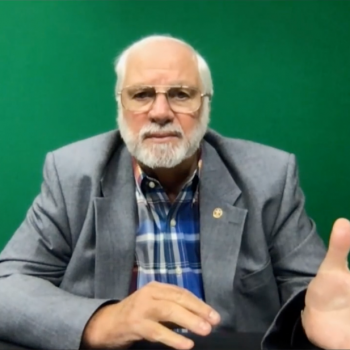In an essay for Foreign Affairs, Ronald F. Inglehart, the author of the forthcoming book Religion’s Sudden Decline: What’s Causing it, and What Comes Next? writes about how he used to think religion was on the rise.
With the collapse of Communism and the election of George W. Bush, religious beliefs appeared to be in ascendence. And according to publicly available data, between 1981 and 2007, there was evidence that people had become more religious, especially in former Communist nations. The rise of the internet didn’t prevent the spread of faith-based dogma.
But that’s no longer the case.

Since 2007, says Inglehart, most nations have taken a swift turn in the other direction — and the decline of religion is happening rapidly.
… since 2007, things have changed with surprising speed. From about 2007 to 2019, the overwhelming majority of the countries we studied — 43 out of 49 — became less religious. The decline in belief was not confined to high-income countries and appeared across most of the world.
Growing numbers of people no longer find religion a necessary source of support and meaning in their lives. Even the United States — long cited as proof that an economically advanced society can be strongly religious — has now joined other wealthy countries in moving away from religion.
…
… From 1981 to 2007, the United States ranked as one of the world’s more religious countries, with religiosity levels changing very little. Since then, the United States has shown the largest move away from religion of any country for which we have data.
He’s basing that on research he’s done in which participants were asked to rank the importance of God in their lives on a 10-point scale. In 2007, Americans averaged 8.2 on that question. By 2017, that number had dropped to 4.6.
That’s a trend we’ve seen in a number of other surveys, too. But if you asked me why it’s happening, I would’ve cited a number of things: Better, wider access to the internet means people seeking out information will be able to find resources. The failures of religious institutions. The way faith-based leaders have been a disaster for countries.
Inglehart, however, points to an entirely different reason:
Several forces are driving this trend, but the most powerful one is the waning hold of a set of beliefs closely linked to the imperative of maintaining high birthrates. Modern societies have become less religious in part because they no longer need to uphold the kinds of gender and sexual norms that the major world religions have instilled for centuries.
Damn right. And thank goodness for that.
Also, despite the warnings of religious conservatives that the Rise of the Nones spells doom for less religious countries, that hasn’t been the case at all.
… countries that are less religious actually tend to be less corrupt and have lower murder rates than more religious ones.
Shocking, I tell you.
As he suggests, a lot of the move away from religion has shifted toward a passion for politics. If I want to know about people’s values and motivations, I may get a better sense of the answer by asking who they’re voting for, not what their religion is. Given the sexual corruption of the Catholic Church and the moral corruption of evangelical Christianity, generations of young people are growing up with the knowledge that faith is not a virtue. Progressives fighting for social justice and racial equality, on the other hand, are doing far more than God ever could to create the kind of world we want to live in.
(Image via Shutterstock)




It’s Moving Day for the Friendly ..."
It’s Moving Day for the Friendly ..."
It’s Moving Day for the Friendly ..."
It’s Moving Day for the Friendly ..."